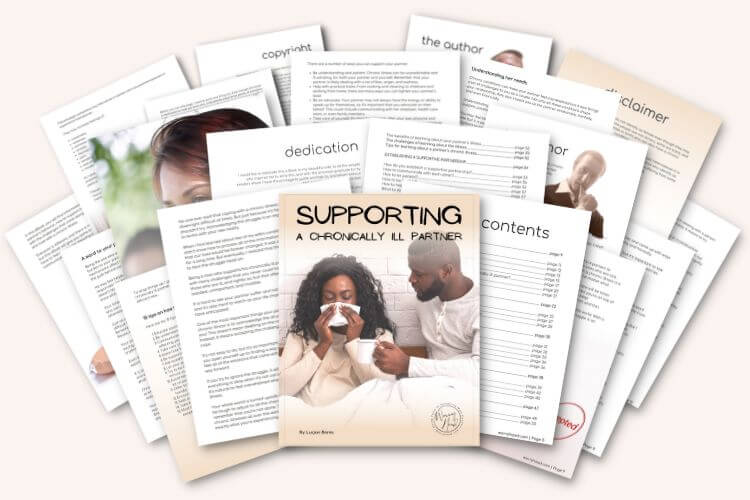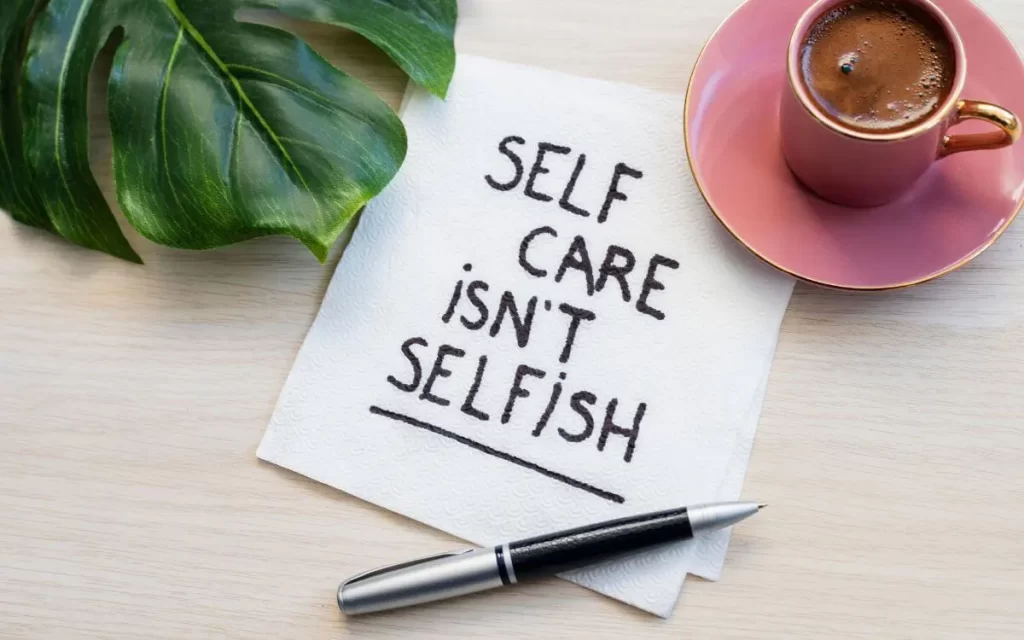Why self-care is important for chronic illness?
Self-care is important for chronic illness because taking care of yourself helps you recover from flare-ups much quicker than you normally would. It’s especially crucial if you have a condition that requires constant treatment or management. Self-care can help you maintain your health and well-being, cope with stress and fatigue, and avoid burnout.
There are many different aspects of self-care, but some of the most important ones include:
- Getting enough rest and sleep
- Eating a healthy diet
- Exercising regularly
- Managing stress
- Avoiding harmful substances
Even though my wife suffers from two chronic conditions and she often experiences chronic fatigue that lasts for a long time, she still thinks of others instead of herself. She shouldn’t feel bad about taking care of her own needs, but she does, but I’ll talk about it later…
The above activities may seem like common sense, but they’re often overlooked or neglected when people are dealing with chronic illness. That’s why it’s so important to make self-care a priority.
What is self-care?
Self-care is any activity that you do deliberately in order to take care of your physical, mental, or emotional health. It’s anything that you do to improve your well-being.
Self-care is important for everyone, but it’s especially important for people who are dealing with chronic illnesses. That’s because chronic illness can be both physically and mentally draining.
Self-care can help you:
- Manage your symptoms
- Reduce stress
- Boost your mood
- Increase your energy levels
- Improve your quality of life
If you want to learn how to take care of yourself, how to cope with your partner’s chronic illness, how to support her struggles, and manage a relationship with a chronic condition, I give away a FREE Chapter of my eBook: “Supporting a Chronically Ill Partner”.
This chapter alone has all the comprehensive information about acknowledging the struggles, including:
- A word to your partner.
- A word to you.
- Stepping on eggshells.
- Understanding her needs.
- How to acknowledge having a chronically ill partner?
- Acknowledging can be hard.
- 15 tips on how to do it!
Get the 1st Chapter FREE!
Chronic Illness for Partners

Examples of self-care.
Rest and sleep are essential for everyone, but they’re especially important for people with chronic illnesses. Fatigue is a common symptom of many conditions, and it can make it difficult to function on a day-to-day basis. Getting enough rest can help you manage your fatigue and improve your overall sense of well-being.
Eating a healthy diet is also important for chronic illness. Eating nutritious foods can help you maintain your energy levels, cope with stress, and fight off infections. It’s also important to stay hydrated by drinking plenty of fluids.
Exercise is another important part of self-care. Exercise can help you maintain your strength and energy levels, as well as improve your mood. It’s important to find an exercise routine that works for you and is gentle on your body.
Managing stress is also crucial for chronic illness. Stress can worsen symptoms and make it difficult to manage your condition. Finding healthy ways to cope with stress can help you feel better and improve your overall health.
Avoiding harmful substances is also an important part of self-care. This includes avoiding tobacco, alcohol, and illegal drugs. These substances can interact with medications, worsen symptoms, and lead to other health problems.
What about partners?
We know that self-care is important for chronic illness but what about partners of chronically ill people? We seem to be always forgotten…
Self-care is essential for managing any chronic illness but what I would like to point out is the fact, that partners of people who suffer from chronic conditions seem to be always swept aside. I would know, I’m one of them.
My wife suffers from endometriosis and fibromyalgia, and even though both illnesses are debilitating on their own, they also cause my wife a lot of anxiety. She developed OCD, and oftentimes she goes through short-term depression, leading to suicidal thoughts.
It can be incredibly challenging for those who suffer, and taking care of themselves can help them maintain their health, and cope with stress. Making self-care a priority can help them live healthier and happier life.
But let’s not forget that for every chronically ill person there is a partner who also needs support. Being a partner of someone with a chronic illness is not easy. It can be emotionally and mentally draining. And yet, we are often expected to be strong and supportive all the time.
We need to take care of ourselves, too. We need to find ways to cope with stress and take care of our own mental and emotional health. Only then we can be the best support for our loved ones.
Please remember that self-care is important for everyone, not just those who suffer from chronic illnesses. We all need to take care of ourselves, both physically and mentally. And we all need to find ways to cope with stress. If you are a partner of someone with a chronic illness, please don’t forget to take care of yourself, too.

The burnout!
What is burnout?
Burnout is a state of physical, emotional, and mental exhaustion. It occurs when we feel overwhelmed and unable to meet the demands of our lives. Burnout can lead to a decline in our physical and mental health, as well as our overall quality of life.
The signs and symptoms of burnout vary from person to person. But there are some common patterns. If you’re experiencing any of the following, you may be experiencing burnout:
- Feeling exhausted all the time
- Feeling overwhelmed by your responsibilities
- Feeling like you’re not good enough
- Lacking motivation
- Feeling disconnected from your work or life
- Having difficulty concentrating
- Feeling irritable or impatient
- Sleeping too much or not enough
- Changes in appetite
- Physical health problems, such as headaches or stomach problems
In order to avoid burnout, it is essential to find a balance between giving and receiving. When we take care of ourselves, we can be more present and available to our loved ones. We can also be more patient and understanding when they need our help.
If you are a caregiver, make sure to set boundaries and ask for help when you need it. Don’t be afraid to take a break from caregiving, even if it’s just for a few hours. And don’t forget to take care of yourself, both physically and emotionally.
It can be difficult to find a balance between taking care of ourselves and taking care of our loved ones. But it’s important to remember that we can’t take care of others if we don’t take care of ourselves first.
Self-care is important for chronic illness and is also vital for the partner. Self-care is not selfish. It’s necessary!
We live in a society that values productivity and often looks down on those who take time for themselves. We’re told that we should be able to do it all and that we should be able to do it all perfectly.
But the truth is, we can’t. And we shouldn’t have to.
It’s okay to take a break. It’s okay to say no. It’s okay to put yourself first. Taking care of yourself allows you to recharge and renew yourself so that you can be the best version of yourself.
To wrap things up…
Chronic illness is a difficult thing to live with. It can be emotionally and mentally draining. And yet, we are often expected to be strong and supportive all the time.
We need to take care of ourselves, too. We need to find ways to cope with stress and take care of our own mental and emotional health. Only then we can be the best support for our loved ones.
To summarize the importance of self-care, I give you 10 reasons why:
- It helps maintain their health
- It helps cope with stress
- It makes them live healthier and happier lives
- It’s necessary for the partner too
- It helps avoid burnout
- It allows them to be the best version of themselves
- It’s okay to put yourself first.
- It’s not selfish to take care of yourself.
- Everyone needs to take care of themselves both physically and mentally.
- Self-care is important for chronic illnesses because it helps them cope with their stress and anxiety. It also helps the partner of the person with chronic illness to understand and be more supportive.
I hope you found the answer to why self-care is important for chronic illness. If you have any questions or your own opinion on the matter, don’t be afraid and share in the comments section below.
I’m looking forward to it. Take care of yourselves!


About Me
Hi, I’m Lucjan! The reason why I decided to create this blog was my beautiful wife, who experienced a lot of pain in life, but also the lack of information about endometriosis and fibromyalgia for men…
